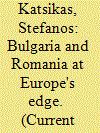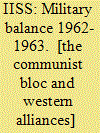| Srl | Item |
| 1 |
ID:
129210


|
|
|
|
|
| Publication |
2014.
|
| Summary/Abstract |
Bulgaria and Romania joined the European Union as full member states on January 1, 2007. This momentous event was the culmination of a long and demanding political project that has often been described as "Europeanization." Although the foundations of this project were laid fairly soon after the fall of both countries' communist regimes in 1989, the pace was slow, and did not really gain momentum
until the end of the 1990s. Over the years the project ebbed and flowed, but what kept both nations committed was their strong belief that joining the EU would fill the political, economic, and security vacuum that the dissolution of the communist bloc had produced. EU membership was popularly seen as a panacea that would allow Bulgaria and Romania to stabilize their newborn democratic systems and overcome the economic problems of the postcommunist transition. It offered confirmation that the Bulgarians and Romanians were really Europeans. Seven years later, however, rather than feeling pulled into the heart of Europe, Bulgaria and Romania find themselves at the edge. Their EU partners raise questions about their commitment to the rule of law and their willingness to crack down on organized crime and illegal immigration. Does this mean that membership has not been an easy route to democratic stability, economic growth, and greater opportunity for all? European integration may be a difficult topic at a time when economic crisis has, for some, cast the entire effort into doubt. But the situation of Romania and Bulgaria lends itself to reflection on the wider project and its overall historical importance.
|
|
|
|
|
|
|
|
|
|
|
|
|
|
|
|
| 2 |
ID:
035779


|
|
|
|
|
| Publication |
London, The Institute for strategic studies., 1962.
|
| Description |
28p.pbk
|
| Contents |
Acc. No. 002006 (Include in this Volume) : 1962-1963
Acc. No. 002173 (Include in this Volume) : 1963-1964
Acc. No. 002174 (Include in this Volume) : 1964-1965
Acc. No. 002175 (Include in this Volume) : 1965-1966
Acc. No. 005529 (Include in this Volume) : 1966-1967
|
|
|
|
|
|
|
|
|
|
|
|
Copies: C:1/I:0,R:1,Q:0
Circulation
| Accession# | Call# | Current Location | Status | Policy | Location |
| 002006 | 355.03/IIS 002006 | Main | On Shelf | Reference books | |
|
|
|
|
| 3 |
ID:
121418


|
|
|
|
|
| Publication |
2013.
|
| Summary/Abstract |
Nicolae Ceausescu of Romania was well-known during the Cold War as a non-conformist voice in the Communist bloc, especially because of his opposition to the Soviet Union and spectacular foreign policy initiatives. But was that line Ceausescu's creation? This analysis examines the sources of Romania's dynamic and autonomous foreign policy in the Cold War and shows that the origins of this foreign policy can be traced back to Ceausescu's predecessor, Gheorghe Gheorghiu-Dej. The shock caused by de-Stalinisation and Nikita Khrushchev's reformist policies saw the Romanian party leadership limit its dependence on the Soviet Union, both politically and economically. Romania's foreign policy experienced a revival starting from the tumultuous moments when Gheorghiu-Dej listened to Khrushchev's Secret Report at the 20th Congress in February 1956. Fearing the loss of his position in power, Gheorghiu-Dej saw relations outside the Communist bloc as a source of stability.
|
|
|
|
|
|
|
|
|
|
|
|
|
|
|
|